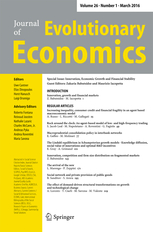
Towards a Theory of Climate Innovation - A Model Framework for Analyzing Drivers and Determinants
Climate change, including its possible causes and consequences, is one of the most controversial and intensely discussed topics of our time. However, European businesses nowadays are less affected by the direct effects of climate change than by its indirect consequences. One central issue that arises in this context is the change in demands imposed by the enterprises’ operational environment. This article contributes to environmental innovation literature by providing a comprehensive framework which allows an analysis of the drivers, determinants and outcomes of climate innovations implemented by companies. In this context, the prime issue is how the perception of climate change affects corporate innovation processes. Firstly, the new demands imposed on the company by its stakeholders are considered. Secondly, the innovative reactions to these impulses are captured. Finally, the functions and relevance of certain internal and external determinants in the innovative process are highlighted.





